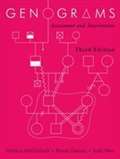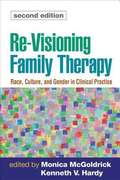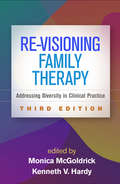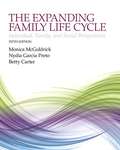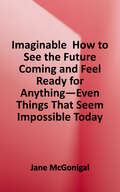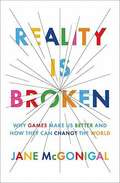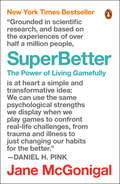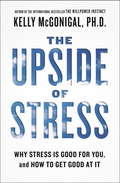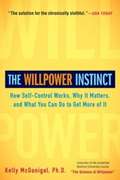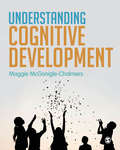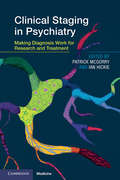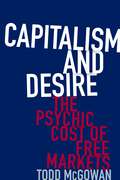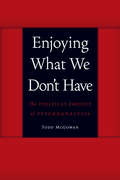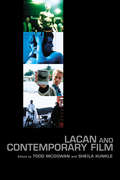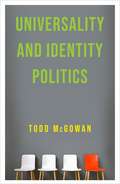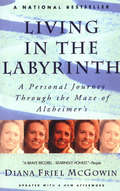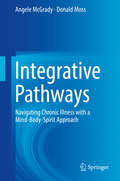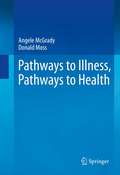- Table View
- List View
Genograms: Assessment and Intervention (3rd edition)
by Monica Mcgoldrick Randy Gerson Sueli PetryWidely used by both family therapists and health care professionals, the genogram is a graphic way of organizing the mass of information gathered during a family assessment and finding patterns in the family system for more targeted treatment. McGoldrick (director, Multicultural Family Institute) explains how to construct a genogram, do a genogram interview, and interpret the results. Genograms of famous families such as the Kennedys, the Fondas, the Freuds, and the Jungs, bring the text to life and help elucidate the principles of family systems theory and systemic interviewing, which form the basis of genogram work. This third edition is updated and expanded. It includes a new color insert and new material on the clinical applications of genograms.
Re-Visioning Family Therapy: Race, Culture, and Gender in Clinical Practice (Second Edition)
by Monica Mcgoldrick Kenneth V. HardyNow in a significantly revised and expanded second edition, this groundbreaking work illuminates how racism, sexism, and other forms of oppression constrain the lives of diverse clients -- and family therapy itself. Practitioners and students gain vital tools for re-evaluating prevailing conceptions of family health and pathology; tapping into clients' cultural resources; and developing more inclusive theories and therapeutic practices. From leaders in the field, the second edition features many new chapters, case examples, and specific recommendations for culturally competent assessment, treatment, and clinical training. The section in which authors reflect on their own cultural and family legacies also has been significantly expanded.
Re-Visioning Family Therapy, Third Edition: Addressing Diversity in Clinical Practice
by Monica McGoldrick Kenneth V. HardyA leading text for courses that go beyond the basics of family systems theory, intervention techniques, and diversity, this influential work has now been significantly revised with 65% new material. The volume explores how family relationships--and therapy itself--are profoundly shaped by race, social class, gender, religion, sexual orientation, and other intersecting dimensions of marginalization and privilege. Chapters from leading experts guide the practitioner to challenge assumptions about family health and pathology, understand the psychosocial impact of oppression, and tap into clients' cultural resources for healing. Practical clinical strategies are interwoven with theoretical insights, case examples, training ideas, and therapists' reflections on their own cultural and family legacies. New to This Edition *Existing chapters have been thoroughly updated and 21 chapters added, expanding the perspectives in the book. *Reflects over a decade of theoretical and clinical advances and the growing diversity of the United States. *New sections on re-visioning clinical research, trauma and psychological homelessness, and larger systems.
The Expanded Family Life Cycle: Individual, Family, and Social Perspectives (Fifth Edition)
by Monica McGoldrick Nydia A. Garcia Preto Betty A. CarterUpdated, expanded, and more comprehensive than ever, this new Fifth Edition a classic family therapy resource, The Expanded Family Life Cycle, gives readers a solid understanding of human development and the life cycle. Featured are a groundbreaking integration of individual development within a systemic context discussion of the increasing racial, ethnic, and cultural diversity across the life cycle in the United States today; life cycle perspectives on LGBT issues, alcohol, sexuality, migration, social class, violence in the family, and assessment of “home place” as fundamental to clinical work.
Imaginable: How to See the Future Coming and Feel Ready for Anything--Even Things That Seem Impossible Today
by Jane McGonigalWorld-renowned future forecaster, game designer, and NEW YORK TIMES bestselling author Jane McGonigal gives us the tool s to imagine the future without fear. An accessible, optimistic field guide to the future. --San Francisco Chronicle "Reading this book is like sitting down with a creative, optimistic friend--and getting up as a new version of yourself.""--Daniel H. Pink, New York Times bestselling author of When The COVID-19 pandemic, increasingly frequent climate disasters, a new war -- events we might have called ""unimaginable"" or ""unthinkable"" in the past are now reality. Today it feels more challenging than ever to feel unafraid, hopeful, and equipped to face the future with optimism. How do we map out our lives when it seems impossible to predict what the world will be like next week, let alone next year or next decade? What we need now are strategies to help us recover our confidence and creativity in facing uncertain futures.In Imaginable, Jane McGonigal draws on the latest scientific research in psychology and neuroscience to show us how to train our minds to think the unthinkable and imagine the unimaginable. She invites us to play with the provocative thought experiments and future simulations she's designed exclusively for this book, with the goal to: - Build our collective imagination so that we can dive into the future and envision, in surprising detail, what our lives will look like ten years from now - Develop the courage and vision to solve problems creatively - Take actions and make decisions that will help shape the future we desire - Access "urgent optimism," an unstoppable force within each of us that activates our sense of agency Imaginable teaches us to be fearless, resilient, and bold in realizing a world with possibilities we cannot yet imagine--until reading this transformative, inspiring, and necessary book .
Reality Is Broken: Why Games Make Us Better and How They Can Change the World
by Jane McgonigalVisionary game designer Jane McGonigal reveals how we can harness the power of games to solve real-world problems and boost global happiness. More than 174 million Americans are gamers, and the average young person in the United States will spend ten thousand hours gaming by the age of twenty-one. According to world-renowned game designer Jane McGonigal, the reason for this mass exodus to virtual worlds is that videogames are increasingly fulfilling genuine human needs. In this groundbreaking exploration of the power and future of gaming, McGonigal reveals how we can use the lessons of game design to fix what is wrong with the real world.Drawing on positive psychology, cognitive science, and sociology, Reality Is Broken uncovers how game designers have hit on core truths about what makes us happy and utilized these discoveriesto astonishing effect in virtual environments. Videogames consistently provide the exhilarating rewards, stimulating challenges, and epic victories that are so often lacking in the real world. But why, McGonigal asks, should we use the power of games for escapist entertainment alone? Her research suggests that gamers are expert problem solvers and collaborators because they regularly cooperate with other players to overcome daunting virtual challenges, and she helped pioneer a fast-growing genre of games that aims to turn gameplay to socially positive ends.In Reality Is Broken, she reveals how these new alternate reality games are already improving the quality of our daily lives, fighting social problems such as depression and obesity, and addressing vital twenty-first-century challenges-and she forecasts the thrilling possibilities that lie ahead. She introduces us to games like World Without Oil, a simulation designed to brainstorm-and therefore avert- the challenges of a worldwide oil shortage, and Evoke, a game commissioned by the World Bank Institute that sends players on missions to address issues from poverty to climate change.McGonigal persuasively argues that those who continue to dismiss games will be at a major disadvantage in the coming years. Gamers, on the other hand, will be able to leverage the collaborative and motivational power of games in their own lives, communities, and businesses. Written for gamers and nongamers alike, Reality Is Broken shows us that the future will belong to those who can understand, , and play games.Watch a Video
Reality Is Broken: Why Games Make Us Better and How They Can Change the World
by Jane McgonigalA visionary game designer reveals how we can harness the power of games to boost global happiness. With 174 million gamers in the United States alone, we now live in a world where every generation will be a gamer generation. But why, Jane McGonigal asks, should games be used for escapist entertainment alone? In this groundbreaking book, she shows how we can leverage the power of games to fix what is wrong with the real world-from social problems like depression and obesity to global issues like poverty and climate change-and introduces us to cutting-edge games that are already changing the business, education, and nonprofit worlds. Written for gamers and non-gamers alike, Reality Is Broken shows that the future will belong to those who can understand, design, and play games.From the Trade Paperback edition.
Reality Is Broken
by Jane McgonigalVisionary game designer Jane McGonigal reveals how we can harness the power of games to solve real-world problems and boost global happiness. More than 174 million Americans are gamers, and the average young person in the United States will spend ten thousand hours gaming by the age of twenty-one. According to world-renowned game designer Jane McGonigal, the reason for this mass exodus to virtual worlds is that videogames are increasingly fulfilling genuine human needs. In this groundbreaking exploration of the power and future of gaming, McGonigal reveals how we can use the lessons of game design to fix what is wrong with the real world. Drawing on positive psychology, cognitive science, and sociology, Reality Is Broken uncovers how game designers have hit on core truths about what makes us happy and utilized these discoveriesto astonishing effect in virtual environments. Videogames consistently provide the exhilarating rewards, stimulating challenges, and epic victories that are so often lacking in the real world. But why, McGonigal asks, should we use the power of games for escapist entertainment alone? Her research suggests that gamers are expert problem solvers and collaborators because they regularly cooperate with other players to overcome daunting virtual challenges, and she helped pioneer a fast-growing genre of games that aims to turn gameplay to socially positive ends. In Reality Is Broken, she reveals how these new alternate reality games are already improving the quality of our daily lives, fighting social problems such as depression and obesity, and addressing vital twenty-first-century challenges-and she forecasts the thrilling possibilities that lie ahead. She introduces us to games like World Without Oil, a simulation designed to brainstorm-and therefore avert- the challenges of a worldwide oil shortage, and Evoke, a game commissioned by the World Bank Institute that sends players on missions to address issues from poverty to climate change. McGonigal persuasively argues that those who continue to dismiss games will be at a major disadvantage in the coming years. Gamers, on the other hand, will be able to leverage the collaborative and motivational power of games in their own lives, communities, and businesses. Written for gamers and nongamers alike, Reality Is Broken shows us that the future will belong to those who can understand, , and play games. Watch a Video .
SuperBetter
by Jane McgonigalAn innovative guide to living gamefully, based on the program that has already helped nearly half a million people achieve remarkable personal growthIn 2009, internationally renowned game designer Jane McGonigal suffered a severe concussion. Unable to think clearly or work or even get out of bed, she became anxious and depressed, even suicidal. But rather than let herself sink further, she decided to get better by doing what she does best: she turned her recovery process into a resilience-building game. What started as a simple motivational exercise quickly became a set of rules for "post-traumatic growth" that she shared on her blog. These rules led to a digital game and a major research study with the National Institutes of Health. Today nearly half a million people have played SuperBetter to get stronger, happier, and healthier.But the life-changing ideas behind SuperBetter are much bigger than just one game. In this book, McGonigal reveals a decade's worth of scientific research into the ways all games--including videogames, sports, and puzzles--change how we respond to stress, challenge, and pain. She explains how we can cultivate new powers of recovery and resilience in everyday life simply by adopting a more "gameful" mind-set. Being gameful means bringing the same psychological strengths we naturally display when we play games--such as optimism, creativity, courage, and determination--to real-world goals.Drawing on hundreds of studies, McGonigal shows that getting superbetter is as simple as tapping into the three core psychological strengths that games help you build: * Your ability to control your attention, and therefore your thoughts and feelings * Your power to turn anyone into a potential ally, and to strengthen your existing relationships * Your natural capacity to motivate yourself and super-charge your heroic qualities, like willpower, compassion, and determination SuperBetter contains nearly 100 playful challenges anyone can undertake in order to build these gameful strengths. It includes stories and data from people who have used the SuperBetter method to get stronger in the face of illness, injury, and other major setbacks, as well as to achieve goals like losing weight, running a marathon, and finding a new job.As inspiring as it is down to earth, and grounded in rigorous research, SuperBetter is a proven game plan for a better life. You'll never say that something is "just a game" again.From the Hardcover edition.
SuperBetter: The Power of Living Gamefully Resilient--Powered by the Science of Games
by Jane McgonigalAn innovative guide to living gamefully, based on the program that has already helped nearly half a million people achieve remarkable personal growthIn 2009, internationally renowned game designer Jane McGonigal suffered a severe concussion. Unable to think clearly or work or even get out of bed, she became anxious and depressed, even suicidal. But rather than let herself sink further, she decided to get better by doing what she does best: she turned her recovery process into a resilience-building game. What started as a simple motivational exercise quickly became a set of rules for “post-traumatic growth” that she shared on her blog. These rules led to a digital game and a major research study with the National Institutes of Health. Today nearly half a million people have played SuperBetter to get stronger, happier, and healthier.But the life-changing ideas behind SuperBetter are much bigger than just one game. In this book, McGonigal reveals a decade’s worth of scientific research into the ways all games—including videogames, sports, and puzzles—change how we respond to stress, challenge, and pain. She explains how we can cultivate new powers of recovery and resilience in everyday life simply by adopting a more “gameful” mind-set. Being gameful means bringing the same psychological strengths we naturally display when we play games—such as optimism, creativity, courage, and determination—to real-world goals.Drawing on hundreds of studies, McGonigal shows that getting superbetter is as simple as tapping into the three core psychological strengths that games help you build: • Your ability to control your attention, and therefore your thoughts and feelings • Your power to turn anyone into a potential ally, and to strengthen your existing relationships • Your natural capacity to motivate yourself and super-charge your heroic qualities, like willpower, compassion, and determination SuperBetter contains nearly 100 playful challenges anyone can undertake in order to build these gameful strengths. It includes stories and data from people who have used the SuperBetter method to get stronger in the face of illness, injury, and other major setbacks, as well as to achieve goals like losing weight, running a marathon, and finding a new job.As inspiring as it is down to earth, and grounded in rigorous research, SuperBetter is a proven game plan for a better life. You’ll never say that something is “just a game” again.From the Hardcover edition.
The Upside of Stress
by Kelly McgonigalThe author of The Willpower Instinct delivers a controversial and groundbreaking new book that overturns long-held beliefs about stress. More than forty-four percent of Americans admit to losing sleep over stress. And while most of us do everything we can to reduce it, Stanford psychologist and bestselling author Kelly McGonigal, Ph.D., delivers a startling message: Stress isn't bad. In The Upside of Stress, McGonigal highlights new research indicating that stress can, in fact, make us stronger, smarter, and happier--if we learn how to embrace it. The Upside of Stress is the first book to bring together cutting-edge discoveries on the correlation between resilience--the human capacity for stress-related growth--and mind-set, the power of beliefs to shape reality. As she did in The Willpower Instinct, McGonigal combines science, stories, and exercises into an engaging and practical book that is both entertaining and life-changing, showing you:how to cultivate a mind-set to embrace stresshow stress can provide focus and energyhow stress can help people connect and strengthen close relationshipswhy your brain is built to learn from stress, and how to increase its ability to learn from challenging experiences McGonigal's TED talk on the subject has already received more than 7 million views. Her message resonates with people who know they can't eliminate the stress in their lives and want to learn to take advantage of it. The Upside of Stress is not a guide to getting rid of stress, but a guide to getting better at stress, by understanding it, embracing it, and using it.From the Hardcover edition.
The Willpower Instinct: How Self-Control Works, Why It Matters, and What You Can Do to Get More of It
by Kelly McgonigalBased on Stanford University psychologist Kelly McGonigal's wildly popular course "The Science of Willpower," The Willpower Instinct is the first book to explain the new science of self-control and how it can be harnessed to improve our health, happiness, and productivity.Informed by the latest research and combining cutting-edge insights from psychology, economics, neuroscience, and medicine, The Willpower Instinct explains exactly what willpower is, how it works, and why it matters. For example, readers will learn:Willpower is a mind-body response, not a virtue. It is a biological function that can be improved through mindfulness, exercise, nutrition, and sleep.Willpower is not an unlimited resource. Too much self-control can actually be bad for your health.Temptation and stress hijack the brain's systems of self-control, but the brain can be trained for greater willpowerGuilt and shame over your setbacks lead to giving in again, but self-forgiveness and self-compassion boost self-control.Giving up control is sometimes the only way to gain self-control.Willpower failures are contagious--you can catch the desire to overspend or overeat from your friends--but you can also catch self-control from the right role models.In the groundbreaking tradition of Getting Things Done, The Willpower Instinct combines life-changing prescriptive advice and complementary exercises to help readers with goals ranging from losing weight to more patient parenting, less procrastination, better health, and greater productivity at work.
The Willpower Instinct: How Self-Control Works, Why It Matters, and What You Can Do to Get More of It
by Kelly McgonigalBased on Stanford University psychologist Kelly McGonigal's wildly popular course "The Science of Willpower," The Willpower Instinct is the first book to explain the new science of self-control and how it can be harnessed to improve our health, happiness, and productivity.Informed by the latest research and combining cutting-edge insights from psychology, economics, neuroscience, and medicine, The Willpower Instinct explains exactly what willpower is, how it works, and why it matters. For example, readers will learn:Willpower is a mind-body response, not a virtue. It is a biological function that can be improved through mindfulness, exercise, nutrition, and sleep.Willpower is not an unlimited resource. Too much self-control can actually be bad for your health.Temptation and stress hijack the brain's systems of self-control, but the brain can be trained for greater willpowerGuilt and shame over your setbacks lead to giving in again, but self-forgiveness and self-compassion boost self-control.Giving up control is sometimes the only way to gain self-control.Willpower failures are contagious--you can catch the desire to overspend or overeat from your friends--but you can also catch self-control from the right role models.In the groundbreaking tradition of Getting Things Done, The Willpower Instinct combines life-changing prescriptive advice and complementary exercises to help readers with goals ranging from losing weight to more patient parenting, less procrastination, better health, and greater productivity at work.
The Willpower Instinct: How Self-Control Works, Why It Matters, and What You Can Do to Get More of It
by Kelly McgonigalBased on Stanford University psychologist Kelly McGonigal's wildly popular course "The Science of Willpower," The Willpower Instinct is the first book to explain the new science of self-control and how it can be harnessed to improve our health, happiness, and productivity.Informed by the latest research and combining cutting-edge insights from psychology, economics, neuroscience, and medicine, The Willpower Instinct explains exactly what willpower is, how it works, and why it matters. For example, readers will learn:Willpower is a mind-body response, not a virtue. It is a biological function that can be improved through mindfulness, exercise, nutrition, and sleep.Willpower is not an unlimited resource. Too much self-control can actually be bad for your health.Temptation and stress hijack the brain's systems of self-control, but the brain can be trained for greater willpowerGuilt and shame over your setbacks lead to giving in again, but self-forgiveness and self-compassion boost self-control.Giving up control is sometimes the only way to gain self-control.Willpower failures are contagious—you can catch the desire to overspend or overeat from your friends—but you can also catch self-control from the right role models.In the groundbreaking tradition of Getting Things Done, The Willpower Instinct combines life-changing prescriptive advice and complementary exercises to help readers with goals ranging from losing weight to more patient parenting, less procrastination, better health, and greater productivity at work.
The Willpower Instinct
by Kelly McgonigalBased on Stanford University psychologist Kelly McGonigal's wildly popular course "The Science of Willpower," The Willpower Instinct is the first book to explain the new science of self-control and how it can be harnessed to improve our health, happiness, and productivity. Informed by the latest research and combining cutting-edge insights from psychology, economics, neuroscience, and medicine, The Willpower Instinct explains exactly what willpower is, how it works, and why it matters. For example, readers will learn: Willpower is a mind-body response, not a virtue. It is a biological function that can be improved through mindfulness, exercise, nutrition, and sleep. Willpower is not an unlimited resource. Too much self-control can actually be bad for your health. Temptation and stress hijack the brain's systems of self-control, but the brain can be trained for greater willpower Guilt and shame over your setbacks lead to giving in again, but self-forgiveness and self-compassion boost self-control. Giving up control is sometimes the only way to gain self-control. Willpower failures are contagious--you can catch the desire to overspend or overeat from your friends--but you can also catch self-control from the right role models. In the groundbreaking tradition of Getting Things Done, The Willpower Instinct combines life-changing prescriptive advice and complementary exercises to help readers with goals ranging from losing weight to more patient parenting, less procrastination, better health, and greater productivity at work.
Understanding Cognitive Development (Discoveries And Explanations In Child Development Ser.)
by Maggie Mcgonigle-ChalmersUnderstanding Cognitive Development provides a fresh, evidence-based research perspective on the story of children's cognitive development in the first ten years of human life. Starting with a brief survey of the key theoretical positions that have come to define developmental psychology, the textbook then focuses on the different cognitive abilities as they emerge throughout early development. Uniquely, it examines these in terms of their interdependence; that is how skills such as perception, memory, language and reasoning relate to one another. This holistic treatment allows students to see the many important intersections in this critical phase of human life development. This textbook employs a novel design that will be of immense help to both students and instructors and is intended to be read at two levels: at the first level, it provides a fully referenced explanatory account of experimental research on cognitive development with complete attention to the needs of students who have never been exposed to experimental methodology nor studies in cognitive development before. At the second level, and mapped directly onto numbered sub-sections within the text, the author uses illustrative panels designed along the lines of PowerPoint presentations to summarise studies and key findings, employing lots of pictorial material together with bullet-points to give vividness and texture to the material covered. These panels are replicated on the accompanying companion website in PowerPoint for lecturers and students to make further use of in teaching and revision. Revision points are provided at the end of every chapter. Rich in academic coverage, including a widespread database of the most important empirical research in the field, this textbook will be essential reading for students of cognitive development and developmental psychology across psychology and education.
Understanding Cognitive Development (Discoveries And Explanations In Child Development Ser.)
by Maggie McGonigle-ChalmersUnderstanding Cognitive Development provides a fresh, evidence-based research perspective on the story of children’s cognitive development in the first ten years of human life. Starting with a brief survey of the key theoretical positions that have come to define developmental psychology, the textbook then focuses on the different cognitive abilities as they emerge throughout early development. Uniquely, it examines these in terms of their interdependence; that is how skills such as perception, memory, language and reasoning relate to one another. This holistic treatment allows students to see the many important intersections in this critical phase of human life development. This textbook employs a novel design that will be of immense help to both students and instructors and is intended to be read at two levels: at the first level, it provides a fully referenced explanatory account of experimental research on cognitive development with complete attention to the needs of students who have never been exposed to experimental methodology nor studies in cognitive development before. At the second level, and mapped directly onto numbered sub-sections within the text, the author uses illustrative panels designed along the lines of PowerPoint presentations to summarise studies and key findings, employing lots of pictorial material together with bullet-points to give vividness and texture to the material covered. These panels are replicated on the accompanying companion website in PowerPoint for lecturers and students to make further use of in teaching and revision. Revision points are provided at the end of every chapter. Rich in academic coverage, including a widespread database of the most important empirical research in the field, this textbook will be essential reading for students of cognitive development and developmental psychology across psychology and education.
Clinical Staging in Psychiatry: Making Diagnosis Work for Research and Treatment
by Patrick D. McGorry Ian B. HickiePsychiatric diagnosis is experiencing a crisis of confidence. Current approaches are outmoded with reform desperately needed. Clinical staging is a solution to this crisis. Clinical staging addresses the limitations of current diagnostic systems by recognising the full continuum or trajectory of mental illness from asymptomatic to chronic illness. It acknowledges the overlap between mental health symptoms during early stages and directly links each stage to treatment and underlying cognitive, neurological and biological changes. This approach enhances chances of early identification, promotes the implementation of safer treatments, and increases opportunities to alter the negative trajectory of mental disorders. This book comprehensively describes the conceptual basis of clinical staging in psychiatry, details current progress in identifying biomarkers for each stage, and explores the implications of staging on treatment and health systems. This book provides a foundation for transformational reform in psychiatric diagnosis.
Capitalism and Desire: The Psychic Cost of Free Markets
by Todd McGowanDespite creating vast inequalities and propping up reactionary world regimes, capitalism has many passionate defenders—but not because of what it withholds from some and gives to others. Capitalism dominates, Todd McGowan argues, because it mimics the structure of our desire while hiding the trauma that the system inflicts upon it. People from all backgrounds enjoy what capitalism provides, but at the same time are told more and better is yet to come. Capitalism traps us through an incomplete satisfaction that compels us after the new, the better, and the more.Capitalism's parasitic relationship to our desires gives it the illusion of corresponding to our natural impulses, which is how capitalism's defenders characterize it. By understanding this psychic strategy, McGowan hopes to divest us of our addiction to capitalist enrichment and help us rediscover enjoyment as we actually experienced it. By locating it in the present, McGowan frees us from our attachment to a better future and the belief that capitalism is an essential outgrowth of human nature. From this perspective, our economic, social, and political worlds open up to real political change. Eloquent and enlivened by examples from film, television, consumer culture, and everyday life, Capitalism and Desire brings a new, psychoanalytically grounded approach to political and social theory.
Enjoying What We Don't Have: The Political Project of Psychoanalysis (Symploke Studies in Contemporary Theory)
by Todd McGowanAlthough there have been many attempts to apply the ideas of psychoanalysis to political thought, this book is the first to identify the political project inherent in the fundamental tenets of psychoanalysis. And this political project, Todd McGowan contends, provides an avenue for emancipatory politics after the failure of Marxism in the twentieth century.Where others seeking the political import of psychoanalysis have looked to Freud&’s early work on sexuality, McGowan focuses on Freud&’s discovery of the death drive and Jacques Lacan&’s elaboration of this concept. He argues that the self-destruction occurring as a result of the death drive is the foundational act of emancipation around which we should construct our political philosophy. Psychoanalysis offers the possibility for thinking about emancipation not as an act of overcoming loss but as the embrace of loss. It is only through the embrace of loss, McGowan suggests, that we find the path to enjoyment, and enjoyment is the determinative factor in all political struggles—and only in a political project that embraces the centrality of loss will we find a viable alternative to global capitalism.
Lacan and Contemporary Film (Contemporary Theory Ser.)
by Todd McgowanThis unique volume collects a series of essays that link new developments in Lacanian psychoanalytic theory and recent trends in contemporary cinema. Though Lacanian theory has long had a privileged place in the analysis of film, film theory has tended to ignore some of Lacan's most important ideas. As a result, Lacanian film theory has never properly integrated the disruptive and troubling aspects of the filmic experience that result from the encounter with the Real that this experience makes possible. Many contemporary theorists emphasize the importance of the encounter with the Real in Lacan's thought, but rarely in discussions of film. By bringing the encounter with the Real into the dialogue of film theory, the contributors to this volume present a new version of Lacan to the world of film studies.These essays bring this rediscovered Lacan to bear on contemporary cinema through analysis of a wide variety of films, including Memento, Eyes Wide Shut, Breaking the Waves, and Fight Club. The films discussed here demand a turn to Lacanian theory because they emphasize the disruptive role of the Real and of jouissance in the experience of the human subject. There is a growing number of films in contemporary cinema that speak to film's power to challenge and disturb the complacency of spectators, and the essays in Lacan and Contemporary Film analyze some of these films and bring their power to light.Because of its dual focus on developments in Lacanian theory and in contemporary film, this collection serves as both an accessible introduction to current Lacanian film theory and an introduction to the study of contemporary cinema. Each essay provides an accessible, jargon-free analysis of one or more important films, and at the same time, each explains and utilizes key concepts of Lacanian theory. The collection stages an encounter between Lacanian theory and contemporary cinema, and the result is the enrichment of both.
Universality and Identity Politics
by Todd McGowanThe great political ideas and movements of the modern world were founded on a promise of universal emancipation. But in recent decades, much of the Left has grown suspicious of such aspirations. Critics see the invocation of universality as a form of domination or a way of speaking for others, and have come to favor a politics of particularism—often derided as “identity politics.” Others, both centrists and conservatives, associate universalism with twentieth-century totalitarianism and hold that it is bound to lead to catastrophe.This book develops a new conception of universality that helps us rethink political thought and action. Todd McGowan argues that universals such as equality and freedom are not imposed on us. They emerge from our shared experience of their absence and our struggle to attain them. McGowan reconsiders the history of Nazism and Stalinism and reclaims the universalism of movements fighting racism, sexism, and homophobia. He demonstrates that the divide between Right and Left comes down to particularity versus universality. Despite the accusation of identity politics directed against leftists, every emancipatory political project is fundamentally a universal one—and the real proponents of identity politics are the right wing. Through a wide range of examples in contemporary politics, film, and history, Universality and Identity Politics offers an antidote to the impasses of identity and an inspiring vision of twenty-first-century collective struggle.
Living in the Labyrinth
by Diana McgowinLiving In The Labyrinth is the story of how one woman found the strength and the courage to cope with a devastating disease that has afflicted five million Americans. Far from being an exercise in self-pity or a standard autobiography, this is an unflinching and ultimately uplifting look at a debilitating illness from the inside out.
Integrative Pathways: Navigating Chronic Illness with a Mind-Body-Spirit Approach
by Angele McGrady Donald MossThis expansive text offers a comprehensive mind/body/spirit framework for relieving individual patients of the debilitating effects of long-term disease while reducing the public burden of chronic illness. It introduces the patient-centered Pathways Model, featuring a robust scientific base for psychotherapy, complementary and alternative modalities, and a religious/spiritual element, in progressive levels of treatment from self-help to professional help. Chapters spotlight component skills of the model, including treatment planning, patient rapport, and choosing therapies for optimal well-being. The authors advocate for interventions ranging from lifestyle change to mindfulness, and biofeedback to pastoral counseling. In addition, in-depth case studies detail memorable patient journeys from diagnosis and referral to assessment, engagement in treatment and outcome. Among the topics covered: · Mind, body, and spirit in chronic illness.· The need for an integrative model to support comprehensive health-supportive change.· Chronic disease from a functional medicine perspective.· Mechanisms by which religious engagement and religion-based variables affect health.· Complementary and integrative medicine for the Pathways Model.· PLUS: Pathways approaches to chronic pain, caregiver stress, diabetes, mood disorders, PTSD, brain injury, heart disease, cancer, and more. Emphasizing patient individuality and clinician creativity, Integrative Pathways models a compassionate approach to lessening persistent suffering for use by health psychologists, physicians, counselors, health coaches, and other practitioners involved in complementary and integrative medicine, pain medicine, and rehabilitation. “The Pathway Model addresses what clinical researchers in the field have been calling for, a research-based approach to health and wellness that clearly explains important concepts and provides an optimal foundation from which to approach health interventions.”Patrick R. Steffen, PhD, BCB, Brigham Young University
Pathways to Illness, Pathways to Health
by Angele Mcgrady Donald MossThis book, designed for professionals, introduces a psychobiological model for understanding the paths that lead people to illness and provides recommendations for alterations of maladaptive pathways so that health is regained. Research findings are incorporated to identify causal variables for illness that can be targets for change. Evidence based recommendations for healthy behaviors and therapies are described. Throughout the book, the authors emphasize recognition of turning points on the path to illness that, through informed decision making and implementation of behavioral change, can be re-directed to pathways to health. This book presents case material to illustrate the directions that lead people to illness or to health. The pathways metaphor provides an organizing force, both in addressing variables contributing to illness onset, and in identifying interventions to restore health. This approach will guide the clinician to understanding how people become ill and the types of interventions that are appropriate for stress related illnesses. The clinician will also become better informed about ways to help clients make better decisions, mobilize clients' survival skills, and implement an interactive model of care. The book includes chapters on stress-related illnesses with high prevalence in today's society. For each illness, the genetic-psychobiological etiology is explored with enough detail so that the clinician understands the best method of patient assessment and treatment. One of the strengths of the book is the step-wise system of interventions that are applied to the stress-related illnesses. Beginning with re-establishment of normal daily psychobiological rhythms and continuing to evidence based state of the art interventions, the professional is presented with detailed intervention plans. For example, the section on "Applications to common illnesses: metabolic disorders of behavior: diabetes, hypertension, and hyperlipidemia" considers the confluence of genetics, behavior, and maladaptive mind body interactions to produce the metabolic syndrome. Then the personal and professional assessments are described to establish the baseline for recommending treatment while fully engaging the patient. Finally, multilevel interventions are formulated for these disorders. The plan begins with clinician guided self care recommendations to re-establish the normal rhythm of appetite and satiety. The next level of interventions consists of skill building techniques, such as relaxation and imagery. Lastly, psychotherapy and advanced applied psychophysiological interventions are detailed. Case examples are used throughout to illustrate the pathways to illness, the turning points, and the pathways to health. From the patients' viewpoints, the pathways metaphor is a motivator. The patient is guided to understand the paths that led to illness. Subsequently, the patient becomes empowered by the pathways framework to begin to make choices that lead to health.
